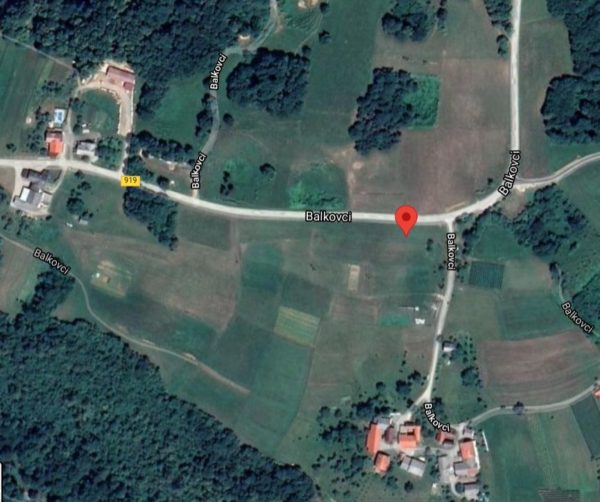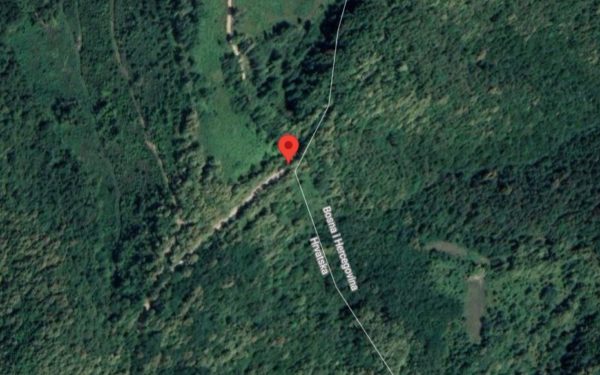Chain-pushback from Slovenia to Velika Kladuša, Bosnia and Herzegovina
This testimony reports a chain pushback of three young men from Iran, including one minor. The group was pushed back from Slovenia, through Croatia to north-western Bosnia and Herzegovina. This took place on the 11th of January 2022.
The respondent is a 19-year-old from Iran. He said that this was the third time he had reached Slovenian territory by foot and was pushed back to Bosnia and Herzegovina.
With the goal to ask for asylum in Slovenia, he together with two friends (17 and 21 years old, also from Iran) started walking from Velika Kladuša on the morning of the 5th of January. After six days of continuously walking through the forest in Croatia, in the morning of the 10th of January, at around 5 am, they crossed the border to Slovenia through a river called Kolpa in the region of Balkovci, Slovenia.
The river was described as deep, with the water reaching up to the respondent’s throat. They left it with soaking wet clothes. After the transit group entered Slovenia, they tried to call the closest police station to ask for asylum. They carried one phone with them but said that it did not work on the Slovenian network. This is the reason why they continued walking to the nearest small village (45.457097, 15.324418). They were hoping to find a local to use their phone to call the police. The respondent assumes that due to the early hour they could not find anyone in the village, so they continued walking until they reached the main street Balkovci. There, they tried to draw the attention of passing cars to themselves in order to use their phones. The respondent related that, after a few minutes, two silver cars arrived from different directions and stopped in front of them. Two women in black uniforms got out of one car, two men in black uniforms got out of the other car. Due to their uniforms, the respondent identified them as four police officers, and reported that each of them was wearing a firearm. The respondent was able to point to the exact location of the apprehension on the map: 45.458811, 15.323967

The respondent states that the male police officers pointed two guns at them and ordered them to sit down and to be quiet. Right after sitting down, they were asked to hand in their personal belongings, which included their phones and backpacks. While the police officers were talking on the phone, they waited sitting on the ground and were not allowed to speak. At this time, the respondent felt very cold, he described. After waiting for what felt like one hour to the respondent at the place of apprehension, another car arrived. It was larger and white. The back of this car was separated from the front part through a partition wall. All three of the respondents were ordered to get into the back of this car.
They were driven for what the respondent estimated was 40 minutes. The respondent stated that the time of arrival at a police station was 7 am. The room of detention had no furniture inside: “In the jail just one blanket, one little bottle of water and one bread“. The respondent described seeing a lot of police cars outside the room, which he referred to as “jail“. Since the respondent described a lot of police officers entering and leaving (“a lot of police everywhere, go and come, go and come, I don’t know how much”) the station might have been a rather big police station or detention side. The respondent was not able to locate it, since he handed his phone over at the apprehension.
Following the logic of the driving times stated in this testimony, it is possible that the police station was the Police Station Črnomelj (Lokve 90, 8340 Črnomelj, Slovenia). The station is a 20-minute drive away, consistent with the respondent’s time approximation. However, this information could not be independently verified. After entering the room of detention, the transit group was reportedly asked to take off their clothes: “First they take my shoes, and my jumpers and my trousers, we had just one small pair of pants and one t-shirt, and after they give us some sandals, white sandals“. During this interaction with the officers, the respondent asked for a permanent stay: “I said them I want to stay, I want to stay here. And police say ‘I know where are you go, you want to go to Italy and he punches the table and say don’t speak!’“[respondent makes gesture of policeman slamming a baton down on a table].
After some time, they were taken to another room in the police station where their fingerprints were reportedly taken, and they were asked to sign at least ten pages of documents in an unknown language. The respondent described that in this room was a desk with a computer and two female officers and one male officer were seated behind it. There was also a translator present, explaining that it is necessary to sign the papers: “He say it’s nothing, it‘s not problem, you just sign, he lied”.
During the period of detention, the respondent asked to use the bathroom. He stated that he had to wait what felt like one hour until he was allowed to do so, and he felt humiliated by that. The respondent believed it to be around 3 pm when the transit group was taken with the same car in front of a hospital, where they were asked to enter another big car and there two medical staff members took a covid-test. Afterward, they returned to the same room of detention as earlier.
When it turned dark outside – the respondent estimated it was 5 pm – the three men were put into a “white small mini-bus”, which the respondent referred to as a “deportation car“, and inside the car he smelled something “very bad, like gas“ what made him feel nauseous and gave him a headache. After what felt like 20 minutes the group was handed over to Croatian authorities. This took place on a bridge and the respondent stated seeing several police cars of different sizes on the other side of the river. The van belonging to the Slovenian authorities and another one similar to that were parked back-to-back close enough that the doors touched when opened and then the transit group was made to pass from one vehicle to another.
During this car change the transit group was given back their boots, but not their jumpers and jackets. When asked about the exact location of that border crossing the respondent repeated he didn’t know because he still did not have a phone. As the respondent stated that he had seen a bridge and that the border-crossing-point was about 20 minutes driving from the police station, it could be suggested that the border-crossing-point was “Border Crossing for International Transit Vinica” (45.45606, 15.24890).
After another approximated 20 minutes ride, they arrived at another police station. According to the respondent’s time specifications, they arrived there between 7 and 8 pm. The conditions of detention in that station were described as “very bad, just very hard, I don’t know how can I say this“. The respondent stated that it was very cold, there was excrement running down the wall, and the possibility of being transferred back to Bosnia and Herzegovina seemed like the better one: “we want to be deported, we don’t want stay here, and he say: ‘Why you come? Now you stay here, in the room’, laughing at us”. They were reportedly not allowed to go to the toilet and there was no food or water provided in the room. During that detention, the respondent recalls that a police officer wearing a dark-blue uniform asked him about the names of his parents, his full name and he had to sign one paper. The paper was in a language he did not understand and there was no translator present. After what the respondent believed to be two hours, they got into a vehicle, similar to the one before. The description matches with the prisoner transport van used by Croatian border police.
The respondent was still in in his t-shirt and described feeling freezing during the next ride because the air conditioner was turned on, even though it was very cold outside: “The cold come from everywhere, I can’t do anything”. When reaching the Croatia-Bosnian border, at around 11pm, he was given back his jumper and jacket as well as the phone belonging to the transit group.
The respondent described the actual pushback location at the Bosnian border to be at a spot with two stones and was able to record the exact location (45.140350, 15.774824).

Waiting for them at the border were two “normal” police cars, descriptions matching with the patrol cars, and approximately 8 people wearing black uniforms that said “police” on the back. To the respondent, this seemed like the Croatian border police. They were pointed in a direction and started walking immediately.
The respondent reported that they reached the camp Miral in Velika Kladuša around midnight after walking for one to two hours. He tried to get registered there but the security guard told him: “No card, no registration, you must go!”.
